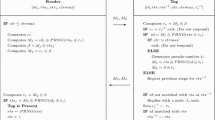Abstract
We discuss insider attacks on RFID protocols with a focus on RFID tag privacy and demonstrate such attacks on published RFID protocols. In particular, we show attacks on a challenge-response protocol with IND-CCA1 encryption and on the randomized hashed GPS protocol.
We then show that IND-CCA2 encryption can be used to prevent insider attacks and present a protocol secure against insider attacks. The protocol is based solely on elliptic-curve operations.
Access this chapter
Tax calculation will be finalised at checkout
Purchases are for personal use only
Preview
Unable to display preview. Download preview PDF.
Similar content being viewed by others
References
Juels, A., Molnar, D., Wagner, D.: Security and privacy issues in e-passports. In: IEEE Conference on Security and Privacy for Emerging Areas in Communication Networks – SecureComm (2005)
Sadeghi, A.R., Visconti, I., Wachsmann, C.: User privacy in transport systems based on RFID e-tickets. In: PiLBA (2008)
Molnar, D., Wagner, D.: Privacy and security in library RFID: issues, practices, and architectures. In: ACM Conference on Computer and Communications Security (2004)
Quartararo, P.: Permanent RFID garment tracking system (US Patent 005785181A) (1998)
Gollmann, D.: Insider fraud (position paper). In: Security Protocols Workshop, pp. 213–219 (1998)
Needham, R.M., Schroeder, M.D.: Using encryption for authentication in large networks of computers. Commun. ACM 21(12), 993–999 (1978)
Burrows, M., Abadi, M., Needham, R.: A logic of authentication. SIGOPS Oper. Syst. Rev. 23(5), 1–13 (1989)
Lowe, G.: Breaking and Fixing the Needham-Schroeder Public-Key Protocol using FDR. In: Margaria, T., Steffen, B. (eds.) TACAS 1996. LNCS, vol. 1055, pp. 147–166. Springer, Heidelberg (1996)
Lowe, G.: Casper: a compiler for the analysis of security protocols. J. Comput. Secur. 6(1-2), 53–84 (1998)
Blanchet, B.: An efficient cryptographic protocol verifier based on Prolog rules. In: 14th IEEE Computer Security Foundations Workshop (CSFW), pp. 82–96. IEEE Computer Society (2001)
Cremers, C.: Scyther - Semantics and Verification of Security Protocols. Ph.D. dissertation, Eindhoven University of Technology (2006)
Vaudenay, S.: On Privacy Models for RFID. In: Kurosawa, K. (ed.) ASIACRYPT 2007. LNCS, vol. 4833, pp. 68–87. Springer, Heidelberg (2007)
Bringer, J., Chabanne, H., Icart, T.: Efficient zero-knowledge identification schemes which respect privacy. In: ASIACCS, pp. 195–205 (2009)
Erguler, I., Anarim, E.: Scalability and security conflict for RFID authentication protocols. Cryptology ePrint Archive, Report 2010/018 (2010), http://eprint.iacr.org/
Damgård, I., Pedersen, M.Ø.: RFID Security: Tradeoffs between Security and Efficiency. In: Malkin, T. (ed.) CT-RSA 2008. LNCS, vol. 4964, pp. 318–332. Springer, Heidelberg (2008)
Hermans, J., Pashalidis, A., Vercauteren, F., Preneel, B.: A New RFID Privacy Model. In: Atluri, V., Diaz, C. (eds.) ESORICS 2011. LNCS, vol. 6879, pp. 568–587. Springer, Heidelberg (2011)
Girault, M., Poupard, G., Stern, J.: On the fly authentication and signature schemes based on groups of unknown order. J. Cryptology 19(4), 463–487 (2006)
Lee, Y.K., Batina, L., Singelée, D., Verbauwhede, I.: Low-cost untraceable authentication protocols for RFID. In: 3rd ACM Conference on Wireless Network Security – WiSec 2010 (2010)
Lee, Y., Batina, L., Verbauwhede, I.: Untraceable RFID authentication protocols: Revision of EC-RAC. In: IEEE International Conference on RFID – RFID 2009, Orlando, Florida, USA, pp. 178–185 (April 2009)
Lee, Y.K., Batina, L., Singelée, D., Verbauwhede, I.: Wide–Weak Privacy–Preserving RFID Authentication Protocols. In: Chatzimisios, P., Verikoukis, C., Santamaría, I., Laddomada, M., Hoffmann, O. (eds.) MOBILIGHT 2010. LNICST, vol. 45, pp. 254–267. Springer, Heidelberg (2010)
Bringer, J., Chabanne, H., Icart, T.: Cryptanalysis of EC-RAC, a RFID Identification Protocol. In: Franklin, M.K., Hui, L.C.K., Wong, D.S. (eds.) CANS 2008. LNCS, vol. 5339, pp. 149–161. Springer, Heidelberg (2008)
Batina, L., Seys, S., Singelee, D., Verbauwhede, I.: Hierarchical ECC-based RFID authentication protocol. In: Workshop on RFID Security – RFIDSec 2011 (to appear, 2011)
Gamal, T.E.: A public key cryptosystem and a signature scheme based on discrete logarithms. IEEE Transactions on Information Theory 31(4), 469–472 (1985)
Damgård, I.: Towards Practical Public Key Systems Secure against Chosen Ciphertext Attacks. In: Feigenbaum, J. (ed.) CRYPTO 1991. LNCS, vol. 576, pp. 445–456. Springer, Heidelberg (1992)
Cramer, R., Shoup, V.: A Practical Public Key Cryptosystem Provably Secure against Adaptive Chosen Ciphertext Attack. In: Krawczyk, H. (ed.) CRYPTO 1998. LNCS, vol. 1462, pp. 13–25. Springer, Heidelberg (1998)
van Deursen, T., Radomirović, S.: Algebraic Attacks on RFID Protocols. In: Markowitch, O., Bilas, A., Hoepman, J.-H., Mitchell, C.J., Quisquater, J.-J. (eds.) WISTP 2009. LNCS, vol. 5746, pp. 38–51. Springer, Heidelberg (2009)
Icart, T.: How to Hash into Elliptic Curves. In: Halevi, S. (ed.) CRYPTO 2009. LNCS, vol. 5677, pp. 303–316. Springer, Heidelberg (2009)
Coron, J.S., Icart, T.: An indifferentiable hash function into elliptic curves. Cryptology ePrint Archive, Report 2009/340 (2009), http://eprint.iacr.org/
Shallue, A., van de Woestijne, C.: Construction of Rational Points on Elliptic Curves over Finite Fields. In: Hess, F., Pauli, S., Pohst, M. (eds.) ANTS 2006. LNCS, vol. 4076, pp. 510–524. Springer, Heidelberg (2006)
Ulas, M.: Rational points on certain hyperelliptic curves over finite fields. Bull. Pol. Acad. Sci. Math. 55(2), 97–104 (2007)
Seroussi, G.: Compact representation of elliptic curve points over F2n. Technical report, Research Contribution to IEEE P1363 (1998)
Okamoto, T., Pointcheval, D.: PSEC-3: Provably secure elliptic curve encryption scheme - V3 (Submission to P1363a). In: IEEE P1363a (2000)
Author information
Authors and Affiliations
Editor information
Editors and Affiliations
Rights and permissions
Copyright information
© 2012 Springer-Verlag Berlin Heidelberg
About this paper
Cite this paper
van Deursen, T., Radomirović, S. (2012). Insider Attacks and Privacy of RFID Protocols. In: Petkova-Nikova, S., Pashalidis, A., Pernul, G. (eds) Public Key Infrastructures, Services and Applications. EuroPKI 2011. Lecture Notes in Computer Science, vol 7163. Springer, Berlin, Heidelberg. https://doi.org/10.1007/978-3-642-29804-2_6
Download citation
DOI: https://doi.org/10.1007/978-3-642-29804-2_6
Publisher Name: Springer, Berlin, Heidelberg
Print ISBN: 978-3-642-29803-5
Online ISBN: 978-3-642-29804-2
eBook Packages: Computer ScienceComputer Science (R0)




